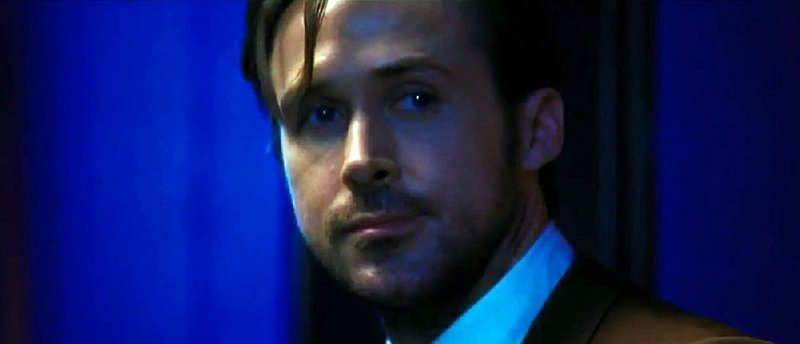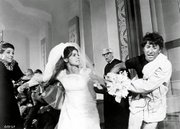Recently, I had the opportunity to watch one of my favorite films of 2016, La La Land, at an outdoor amphitheater, accompanied by the extraordinary Chamber Orchestra of Philadelphia. Transposed to such a venue, under the stars, as it were, the film worked nearly as well as when I first saw it on an IMAX screen in Toronto last September. The music, as re-created by the orchestra, was just as engaging, the filmmaking just as fetching and, most importantly, the love story, embodied by affable leads Ryan Gosling and Emma Stone, as a wannabe jazz musician and a wannabe actress respectively, every bit as wrenching. By the time Mia unwittingly waltzes into Seb's club with her new husband (Thomas Everett Scott) in tow, and the two old lovers share a brief musical interlude devastatingly imagining a very different course of events between them, I was nearly as shattered watching them share that last rueful smile across the darkened bar as I had been months before in Toronto.
The thing was, after dabbing my eyes, this time I got to ask myself why it was I felt that way. After all, both Seb -- who has finally opened his own successful jazz club -- and Mia -- who has become a bona fide movie star -- have seen their formidable dreams come to ripe fulfillment. They both seem happy -- Mia even has a baby girl to go with her kindly doting husband and fabulous career -- and they have both moved on in a way to suggest they absolutely made the right decision when they split up. So, why is the ending so bittersweet? Why does the film's melancholy close overpower what up to that point had been high-flying, colorful delight?
I suspect it has to do with our proximity to the couple. As the film opens, we see them (just) before they meet for the first time (a bit of a nasty exchange on a jammed up L.A. freeway), then their subsequent chance meetings -- at a swank restaurant where Seb has just been fired for playing jazz riffs over the Christmas playlist; a buzzy pool party, where, hilariously, Seb is playing keys for an '80s homage band -- their unforgettable first shared dance in the spotlight of a streetlamp on a strip of road overlooking the city lights; their first date, culminating in them rising into the heavens and dancing among the stars of the L.A. Planetarium (curiously empty and unguarded at night). We live with them through their early courtship, watch their relationship progress as they encourage each other to keep pushing their dreams forward. By the time Mia enters Seb's club near the end, we have witnessed their rise and fall, and find in it, somehow, a sense of our own emotional fragility.
In the pair, we see every failed but intense relationship we've ever experienced. Sometimes -- often, in fact -- we simply turn out not to be suited for each other; but other times, there is the nagging sense that the person might well have been absolutely meant to be, but the timing was just enough off-kilter that we couldn't make it work, even when it seems as if we should have. It's a pain that never quite leaves you, even if the rest of your life turns out relatively sanguine. It could have been different; it was meant to have been different. The idea of the One That Got Away can plague us to our dying breath.
Except, of course, film romances, much like the real thing, can also be an abject lesson in being careful what you are wishing for: Compare the fate of Seb and Mia with that of another famous on-screen couple: Ben (Dustin Hoffman) and Elaine (Katharine Ross), the young couple who run off together at the end of Mike Nichols' brilliant The Graduate. Ben and Elaine's first date begins as an absolute disaster: Ben, having been enjoying an affair with Elaine's mother, Mrs. Robinson (Anne Bancroft) most of the summer, is forced to go out with her comely daughter by his mother, who desperately wants him to take stock in himself and move forward -- or in any direction -- rather than lounging by (or in) their pool, and avoiding all attempts at becoming an adult.
Dating her daughter is the one thing Mrs. Robinson has strictly forbade Ben from doing, so at first he wants nothing at all to do with her. She's a forced burden that will undoubtedly cost him later on with her mother. But a curious thing happens in the course of their evening. Eventually, they begin to talk, actually talk, about their lives and the strange, precarious position they find themselves in (Ben: "It's like I was playing some kind of game, but the rules don't make any sense to me") and for the first time since the film's famous opening coda (Ben at the airport over "The Sounds of Silence"), a light begins to flicker in Ben's eyes, as if his lungs are finally able to take in air.
By the end, defying everyone, including Mrs. Robinson, his parents, and most of all, her groom to be, Ben infiltrates Elaine's wedding and rushes her out of the church (blocking the exit doors, symbolically enough, with a large holy cross) and down the street to a bus stop, where they deliriously hop on and go on the lam. It's momentarily giddy, that moment with them on the bus. They're out of breath, sweating, Elaine still in her wedding gown, but they've done it. They've beaten the system and escaped ... only the camera stays with them beyond that first blush of excitement and when that fades, what we see, our last image of the couple, is them staring blankly straight ahead, Ben with the same vacant expression as when we first saw him. He's gotten the girl, but it hasn't ultimately proved to change his life.
Here, we get exactly what we might have wanted: We're pulling hard for Ben as he frantically races to the church to get to Elaine in time, after all, and it seems as good a solution as any, right up until when that bus shows up. At the end, as the camera, which has been dutifully trailing behind the bus suddenly slows to a stop, letting the bus pull away, we realize we've made the same mistake Ben made in assuming the inertia that plagued him was due to external forces. It's as if we tried to play matchmaker with a good friend, sending them someone we thought sounded great to us on paper, only to discover, to our horror, how misguided our choice might have been.
As demi-tragic as Seb and Mia might seem, we only get a personal fantasia version of what their lives might have been: Mia still gets the role that propels her to Paris and then stardom, but Seb has to abandon his jazz club dream in favor of hers, playing willing house husband to their young son (the gender switching of their child a detail I only noticed upon subsequent viewings), in order to fulfill his wife's fabulous life. Maybe that would have sunk them as well and, eventually, caused tiny threads of discord that would sow into full-blown fissures. Maybe Mia's fame would eventually go to her head, as it does to so many, and her long hours, and monthslong film shoots in exotic locales surrounded by fellow young, attractive thespians would have ended up with her betraying him. Maybe the fantasy of what they might have been is far, far better than the reality that could have doomed them. It's painful to acknowledge, but maybe some of these romantic alternate realities we agonize over are much better off as unfulfilled possibilities. Maybe their pursuit of self-reliance actually trumps the idealized notion of finding that Special One and devoting your lives together in perfect harmony.
Theirs is a romance perfect in its nonrealization: We see them begin, we see them end, and we feel as if they should have stayed together for each other, but besotted as we are by the colorful, vibrant glory of Damien Chazelle's Hollywood (and Justin Hurwitz's fine musical score), maybe it's just as well there's no room for the sort of real-life experience that we get to witness between Ben and Elaine. We never get to see the courtship of Mia's husband (part of the reason we may find ourselves resentful of poor Scott, a generally likable actor, who himself played the young romantic foil in Tom Hank's That Thing You Do, some 20 years earlier), never get to witness the charming ways in which they might have first found each other, but we don't care: We only have eyes for her and Seb, everything else feels like a loss, a death, a missed opportunity for perfect, destined happiness, even if the reality would likely have gone somewhere sideways and skewed. In the end, maybe it's better off for all of us that we never have to see them get on that bus together.
MovieStyle on 09/01/2017

